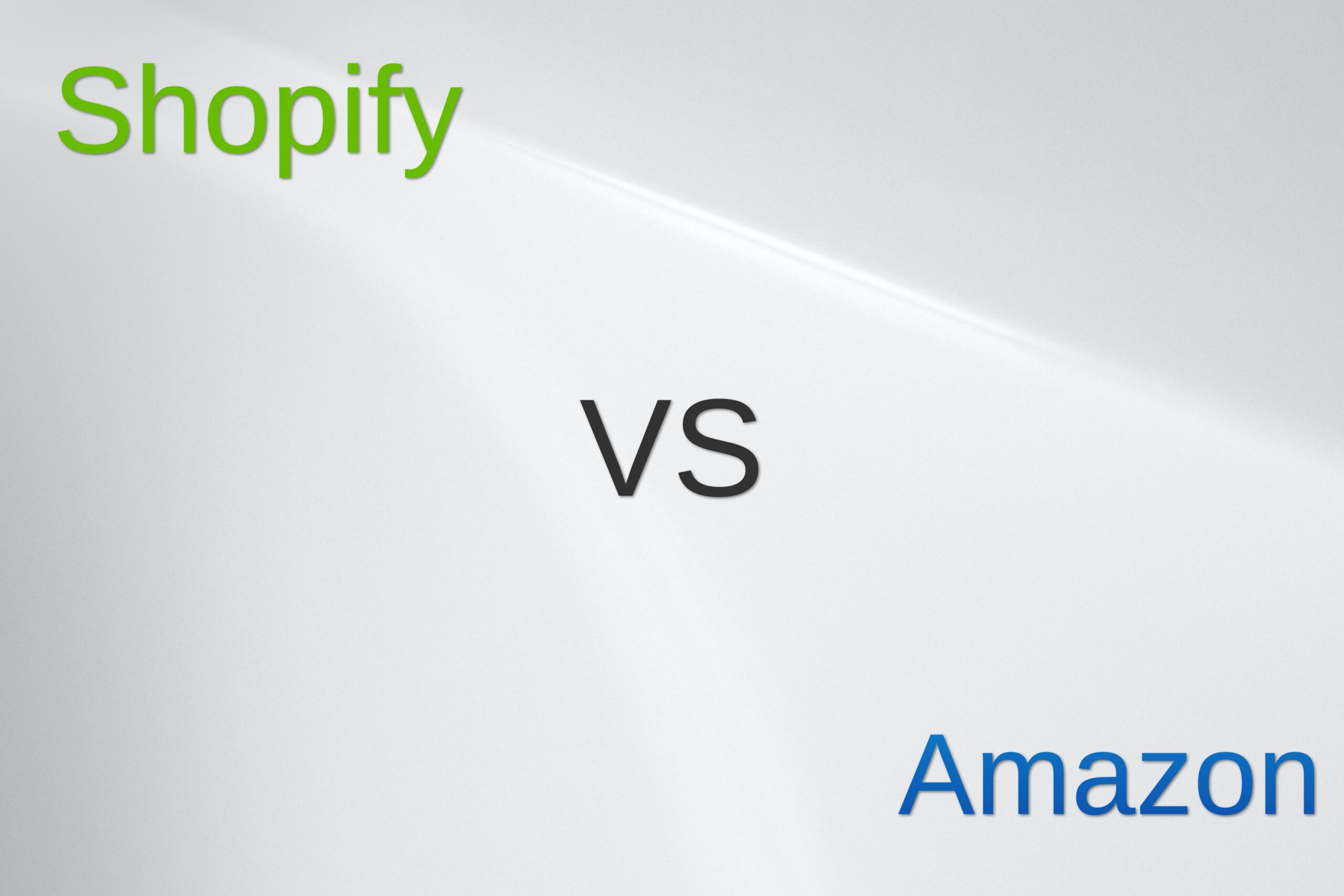How is Shopify different from Amazon ?
The number of online shoppers keeps climbing every year, which means there are a lot of possibilities for e-commerce entrepreneurs as well. Before starting an online business, you should choose an e-commerce platform where you will set up. There are many feature-rich platforms available, but we’ll focus on two popular options in this guide: Shopify and Amazon.
Shopify is an easy-to-use platform for users to sell their products online. Moreover, Amazon is an online market with millions of customers.
Shopify is a subscription-based e-commerce platform that lets businesses create their brand and showcase them online. Users can create websites using themes that are easy to use and suitable for mobile devices. There are even features related to marketing, store management, analytics, and third-party integrations to boost the site’s functionality.
There are different pricing options for both platforms. For $29 per month, Basic Shopify allows you to build and customize an online store, create product listings, manage product inventory, and fulfill orders. The more costly options provide access to their advanced reporting capabilities, carrier-calculated shipping charges, and international price adjustments.
Amazon has two pricing plans: a personal plan and a business plan. The Individual plan requires vendors to pay $0.99 for every item sold. In the meantime, it costs $39.99 per month. While Shopify assesses a dealing fee of up to 2% for users who don’t use Shopify Payments, Amazon collects a referral price for each item sold based on the product category.
In addition, Amazon sellers have no authority over their storefront design. To attract customers, they depend on ads paid for by Amazon, but there is a great deal of competition within the platform. While Shopify users can design and customize their online store, they must create their brand from the ground up.
Getting an individual Amazon salesperson account is free with an individual plan. Unlike Shopify, you can’t build a storefront, but you have immediate management over product images and descriptions. Because Amazon presents its products alongside its competitors, it makes it more difficult to attract customers’ attention.
Shopify provides Marketing Options like Social media integration, gift cards, discount codes, and Google Ads credits while Amazon provides some Marketing Options like Amazon paid ads and competitive pricing.

Why do people prefer Shopify over Amazon?
In recent years, Shopify has appeared as a popular platform for online businesses, with many entrepreneurs and retailers choosing it over the e-commerce giant Amazon. While Amazon has a long-standing reputation and is still the predominant player in the e-commerce industry, there are several reasons why people choose Shopify over Amazon. In this blog, we will analyze some of these reasons.
Customization and Control
One of the primary reasons why people prefer Shopify over Amazon is the level of customization and control it provides. Shopify allows businesses to create their own unique online store, with complete control over the structure, design, and functionality of their website. This level of customization is not available on Amazon, where businesses have to conform to Amazon's rules and guidelines, limiting their capacity to stand out from competitors.
Flexibility
Shopify offers better flexibility in terms of payment options, shipping, and satisfaction. Shopify allows businesses to merge with multiple payment gateways, whereas Amazon restricts businesses from using Amazon Pay or a merchant account. Also, Shopify provides more flexibility in terms of shipping and satisfaction, allowing businesses to choose their own best shipping methods and carriers.
Lower Fees
Another reason why people choose Shopify over Amazon is the lower fees. While Amazon charges fees for listing products, selling products, and fulfillment, Shopify has an exact pricing structure, with a monthly fee and a transaction fee. This makes it easier for businesses to expect and manage their costs.
Branding
Shopify allows businesses to build their own brand uniqueness, whereas Amazon is primarily focused on its own brand. With Shopify, businesses can create their own branding, including logos, colors, and images, helping them to stand out and build a unique identity.
Community and Support
Finally, Shopify has a strong community of users and developers, offering support and resources to businesses. Amazon also has a community, but it is primarily focused on buyers rather than sellers. Shopify's community is dedicated to helping businesses succeed, with forums, webinars, and other resources available to help businesses grow and succeed.
In conclusion, there are several reasons why people prefer Shopify over Amazon. From the level of customization and control to lower fees, greater flexibility, and the ability to build their own brand identity, Shopify offers many advantages over Amazon. While Amazon still dominates the e-commerce industry, Shopify is becoming an increasingly popular choice for businesses looking for more control, flexibility, and support.
How can Shopify beat Amazon?
Shopify and Amazon are two of the most famous e-commerce platforms in the world. Amazon has been the leader in online retail for many years, and it seems like an impossible task to beat them. However, Shopify has been growing rapidly in recent years and has become a worthy competitor to Amazon. In this blog, we will discuss how Shopify can beat Amazon.
Focus on Niche Markets
Amazon caters to a wide range of customers and sells almost everything under the sun. Shopify can beat Amazon by focusing on niche markets that Amazon may not be catering to. For example, Shopify can focus on selling handmade or customized products, which Amazon may not offer on a large scale.
Create a Better Customer Experience
Shopify can differentiate itself from Amazon by creating a better customer experience. Shopify can offer personalized recommendations and a more personalized shopping experience for its customers. This can help Shopify build a loyal customer base that will keep coming back to the platform.
Lower Fees for Merchants
Amazon charges a significant amount of fees for merchants to sell on its platform. Shopify can beat Amazon by lowering its fees for merchants, making it more affordable for small businesses to sell on its platform. This can attract more merchants to Shopify, which can lead to more products and a wider range of choices for customers.
Offer a More Personalized Approach
Amazon has become known for its algorithm-driven approach to selling products. Shopify can beat Amazon by offering a more personalized approach to customers. This can include personalized product recommendations based on a customer's purchase history and browsing behavior. This can create a more interesting and personalized shopping experience for customers.
Emphasize Social Responsibility
Shopify can differentiate itself from Amazon by emphasizing its social responsibility efforts. This can include partnering with charitable organizations or promoting sustainable and environmentally-friendly products. This can attract customers who are looking to shop with companies that align with their values.
In conclusion, Shopify can beat Amazon by focusing on niche markets, creating a better customer experience, lowering fees for merchants, offering a more personalized approach, and emphasizing social responsibility. While it may be a difficult task to beat Amazon, Shopify has the potential to become a worthy competitor by implementing these strategies.
What makes Shopify unique?
There are some points to make Shopify unique.
Scaleability
Shopify is a powerful user-friendly platform. It’s simple to extend for both small and large online shops.
Secure Checkout
there are transactions involved, an e-commerce platform must have a ensure checkout page. To provide a smooth transaction, Shopify hosts checkout for all the stores and doesn’t allow someone to modify this functionality.
Easy Backend
Shopify has one of the easiest backends to use. A store admin can easily understand and get used to it very fast.
Theme
Themes give a unique look and feel to a store and Shopify offers thousands of themes.
Payment Gateways
With a multi number of Payment Gateway choices like PayPal, Amazon pay, etc., Shopify gives the payment to be processed with debit/credit cards and transferred to the store owner’s bank. Shopify offers an actual payment process by allowing all the popular gateways by default.
Enhanced eCommerce
Google Analytics' higher eCommerce features that help to actually analyze user behavior, buying cycle, and exits from the purchasing funnel can be easily accessed in Shopify. Improved eCommerce is a default feature in Shopify.
DoorShipping
Using Shopify, you can also establish a Shopify dropshipping from which you do not need any inventory.
Multi-Sale Channel
Shopify offers a combination of sales channels like online stores, Facebook shops, and Pinterest to sell products.
Is Amazon using Shopify?
Amazon is not using Shopify. While Amazon does have its own e-commerce platform, it is primarily a marketplace for third-party sellers. Amazon does not use Shopify or any other third-party e-commerce platform to power its online marketplace.
However, some Amazon sellers may use Shopify to create their own online stores and integrate with Amazon through third-party apps or services. This allows them to manage their inventory and sales across multiple channels, including Amazon and their own website.
In conclusion, while Amazon and Shopify are both major players in the e-commerce space, Amazon does not use Shopify as its own e-commerce platform. Amazon operates its own online marketplace and provides fulfillment services for its sellers, while Shopify enables businesses to set up their own online stores.
Why is Shopify different from other platforms?
Shopify is an important e-commerce platform containing everything you need or is looking for in your e-commerce store. This secure eCommerce software serves as a complete bunch for your eCommerce website and allows you to easily create various pages with an inbuilt online editor, sell in multiple locations via integration of local language support and customize online stores.
There are reasons why Shopify is the best eCommerce platform.
Hosted solution
Shopify is a cloud-based setup and hosted solution where you do not need to worry about servers or databases. You can access your store from anywhere with administrative login details and an Internet connection without any configuration. Most importantly, it helps you manage the payment gateway, making your job easy and uninterrupted.
Inbuilt Marketing Tools
Shopify includes integrated marketing tools to reduce the cost of a start-up. It enables you to add the page title, meta titles, unique URLs, and meta description, make the pages visible and invisible, and redirect the necessary pages. It also allows you to optimize the shop according to your preferences. Besides, it integrates into Facebook, Twitter, and Pinterest, the most famous social media platforms that allow the way to boost product promotions.
Technical Support
You will need technical assistance when running an online shop with an eCommerce shopping cart. Shopify ensures 24/7 technical support; hence, you can reach customer care whenever fault glitches arise. They will answer the call or refer you to live chats.
Speed & Security
Speed is the critical factor for the success of an eCommerce site as it helps to boost your sales. The faster your web pages load, the more your website retains users. Shopify also provides the best service in terms of security and integration between payment suppliers.
Which is easier to use, Shopify or Amazon?
They’re both easy to use in their ways. Amazon applies less work than Shopify because you just have to set up and get selling. But Shopify makes it easy to create your online store. Shopify is more comfortable to use and built to support beginners researching the platform, and growing small businesses, and established enterprise businesses. Shopify is here to help you move from first sale to full scale. Shopify has a clean, clear, and easy interface that makes setting up your store a breeze, even for total beginners.
Which is cheaper to sell with, Shopify or Amazon?
If you're looking to start an online business, you may be wondering which platform is cheaper to sell Shopify or Amazon. Both platforms have their pros and cons, and the answer to this question ultimately depends on your business needs and goals. In this blog post, we'll take a closer look at the costs associated with selling on both platforms to help you make an informed decision.
Shopify
Shopify is an all-in-one e-commerce platform that allows you to create an online store, manage products, process payments, and track orders. The platform presents a range of pricing plans, including:
Basic Shopify
$29 per month
Shopify
$79 per month
Advanced Shopify
$299 per month
In addition to the monthly subscription fee, Shopify charges transaction fees ranging from 0.5% to 2% per transaction, depending on the pricing plan you choose. These costs can add up, especially if you have a high volume of sales. However, if you use Shopify Payments as your payment gateway, the transaction fees are waived.
Other costs associated with selling on Shopify include
App fees
Shopify has an app store with over 4,000 apps that can add functionality to your store. While some apps are free, others require a monthly or one-time fee.
Theme fees
Shopify has a variety of free and paid themes to choose from. Paid themes range from $100 to $350.
Marketing costs
You'll need to invest in marketing your store to drive traffic and sales.
Amazon
Amazon is the biggest online marketplace in the world, with over 300 million active consumers. It allows you to sell products directly to customers without having to create your website or online store. There are two major ways to sell on Amazon:
Amazon Individual Seller
This plan charges a per-item fee of $0.99 per sale, plus a referral fee that varies depending on the product category. Referral fees typically range from 6% to 45% of the item's sale price.
Amazon Professional Seller
This plan charges a monthly subscription fee of $39.99 but does not charge a per-item fee. Referral fees are the same as for Individual Sellers.
Other costs associated with selling on Amazon include
FBA fees
If you use Amazon's Fulfillment by Amazon (FBA) service, you'll need to pay storage fees and fulfillment fees. Storage fees are charged based on the amount of space your inventory takes up in Amazon's warehouse, while fulfillment fees are charged based on the size and weight of the items you sell.
Advertising fees
Amazon offers a variety of advertising options to help you promote your products on the platform. Advertising costs can vary depending on the ad format and targeting options you choose.
Shipping costs
If you don't use FBA, you'll need to ship your products to customers yourself. Shipping costs will vary depending on the size and weight of the items you sell, as well as the shipping method you choose.
So, which platform is cheaper to sell Shopify or Amazon? The answer relies on your business needs and goals.
Here are some factors to consider
Sales volume
If you're just starting and have a low sales volume, Amazon's Individual Seller plan may be the cheaper option. You'll only pay fees when you make a sale, and the referral fees are typically lower than Shopify's transaction fees.
Branding
If you want to build your brand and have more control over your online store, Shopify may be the better option. With Shopify, you can customize your store's design and layout, and create a more unique shopping experience for your customers.


